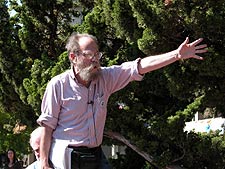Berkeleyan
For some, the free-speech battle isn’t over yet
The FSM Cafe as a ‘device of oppression,’ and other observations
![]()
| 14 October 2004
The skunk at the garden party of Free Speech Movement nostalgia turned up last Thursday at the spot where it all began, invited by one of the organizers of the weeklong celebration, FSM historian Michael Rossman.
Twenty-four hours before a Sproul Plaza rally drew 3,000 to hear Howard Dean speak from atop a police car, Rossman was part of an aggressively alternative quartet whose stage was a chair at the edge of the plaza, just off the Bancroft Way strip where the seeds of rebellion were planted in 1964.
Star power for the event — which carried the title “FSM and the Sixties: Lessons for Today” — was supplied by British-born Alexander Cockburn, a longtime columnist for The Nation and co-editor of the online magazine CounterPunch. Sounding a theme that would echo throughout the hour, Cockburn, who has lived in the U.S. since 1973, declared, “Free speech is worth nothing unless it’s militant free speech, unless it’s subversive free speech, unless it’s organized free speech.”
Jack Heyman, a longshore-union business agent who was arrested at an Iraq-war protest in Oakland last year, told the gathering of several dozen listeners, “It’s not enough to simply commemorate the Free Speech Movement of 40 years ago.…Free speech means you’re willing to put your life on the line.”
 Longtime lefty activist Lenni Brenner was asked “Whose side are you on?” by one fed-up Sproul Plaza listener. “Free speech,” Brenner replied. (Deborah Stalford photo) |
Rossman, who has written extensively about the FSM, pointed to what he termed the “schizophrenic relationship” between Berkeley administrators and free speech. “Free speech was never won at Berkeley,” he insisted, citing difficulties faced by graduate- student instructors in their attempts to form a union. “It’s not over,” he said. “The same problems, the same struggles occur and occur again.”
Widespread acceptance of the FSM, he said, began only after Mario Savio’s death in 1996. “When Mario dies, the Free Speech Movement suddenly becomes OK across the county. It becomes known as part of the ‘good Sixties,’” said Rossman sardonically, complaining that Berkeley has yet to properly honor the movement.
Rossman bluntly derided the doughnut-shaped slab on the plaza — a monument to the FSM. The hole in the center of the concrete circle, he observed, is “too small to contain even an individual human brain, let alone to testify to the fact that the FSM was a superbly collective movement.”
“There is [still] no explicit mention of the Free Speech Movement” in Sproul Plaza, Rossman continued. There is a plaque for Savio on the steps of Sproul Hall, he noted, but “Mario was not the movement. He was a hero, but he was not the movement.”
As for the FSM Café, “I’m all for it,” he said. “People should go there and plot revolution . . . [but] it is a device of oppression if it stands there with those pretty pictures and students do not use it as a base for proud activism.”
Rossman recalled Brenner — known as Lenny Glaser in 1964 — as a non-student “Marxist agitator” who would stand near the Bancroft strip and rail about the Pope, the Bay of Pigs, and marijuana, indifferent to the fact that most passersby thought he was “certifiably crazy.”
Both he and Brenner, who spent 39 months in prison after being arrested at a civil-rights demonstration with a roach in his pocket, blamed interference from campus administrators for the severity of Brenner’s sentence. Brenner said he plans to petition the university to hire him as a history lecturer for 39 months as recompense.
“They will decide whether they want me inside the tent as a lecturer, pissing out,” he said, “or outside the tent as an agitator, pissing in.”

